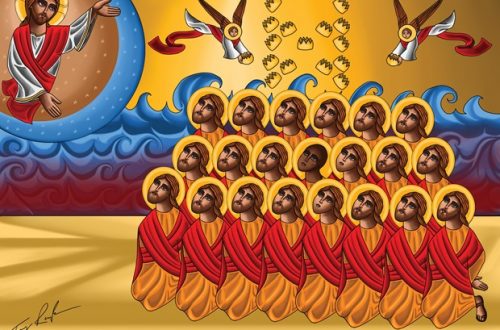One morning after I had taught a women’s Bible study on the life of Abigail, wife of Nabal, a woman hustled over to me, elbows swinging. Seeing her body language, I braced myself.
Her argument about my teaching went something like this: “You're wrong! Abigail was most definitely not righteous. By taking matters into her own hands, she shows what happens when a wife steps out from under her husband’s ‘umbrella of authority.’ If Abigail had submitted to Nabal rather than intervening, David would have felt guilty for killing him, and it would have kept him from killing later."
I’d heard this interpretation once before—from Bill Gothard, among others. So how do we figure out how to interpret this story? Was Abigail good or evil?
The text itself gives us the clues we need.
We find the narrative in 1 Samuel 25:2–43. The narrator begins with his assessment: “[Abigail] was both wise and beautiful.” But of Nabal the storyteller says, “But the man was harsh and his deeds were evil” (v. 3). The first clues about how to view this story appear at the beginning.
Now, Nabal was filthy rich, and David’s men had treated his servants well. But when the time came for Nabal to reciprocate, he screamed at the king’s servants: “WHO IS DAVID, AND WHO IS THIS SON OF JESSE? This is a time when many servants are breaking away from their masters! Should I take my bread and my water and my meat that I have slaughtered for my shearers and give them to these men? I don’t even know where they came from!”
Whoa. As they say in Texas, “Them’s fightin’ words!”
When David heard how Nabal had dissed him, he rounded up four hundred men. His plan: wipe out Nabal and every one of his children and slaves. Nabal was totally outnumbered.
Fortunately, one of Abigail’s servants told her what Nabal had done. This slave provided the backstory about how David’s men had treated Nabal’s servants with utter kindness and deserved better from Nabal. The servant needed Abigail to intervene, or he would die along with the rest.
Abigail chose to act. But it wasn’t just her own neck she sought to save. It was hers, and her kids', and her servants'—and her evil husband's!
Abigail was no rebel. She was a peacemaker. And as such, she put together enough food for the army and sent her servants ahead of her. But she did not tell her husband. Nabal would have tried to stop her, and a lot of innocent people would have died.
Riding on her donkey, the equivalent to a Mercedes, she went down to meet David and his men. By the time she met up with him, David was good and worked up over Nabal's insults. David planned to kill all the men in any way associated with Nabal’s household
When Abigail met David, she showed the humility her husband should have exhibited. She “got down off her high horse,” threw herself to the ground, fell at his feet and pleaded with David. And notice how much she talked about the Lord: “Please forgive the sin of your servant, for the Lord will certainly establish the house of my lord, because my lord fights the battles of the Lord. May no evil be found in you all your days! When someone sets out to chase you and to take your life, the life of my lord will be wrapped securely in the bag of the living by the Lord your God. But he will sling away the lives of your enemies from the sling’s pocket! The Lord will do for my lord everything that he promised you, and he will make you a leader over Israel. Your conscience will not be overwhelmed with guilt for having poured out innocent blood and for having taken matters into your own hands. When the Lord has granted my lord success, please remember your servant.”
Did you catch that? Abigail was focused on God. And she considered it evil to “take matters into your own hands”—the very action for which she is accused by contemporary critics. So…either this story is full of extreme irony or Abigail is a model of righteousness.
Notice the future king's "God talk." He said, “Praised be the Lord, the God of Israel, who has sent you this day to meet me! Praised be your good judgment! May you yourself be rewarded for having prevented me this day from shedding blood and taking matters into my own hands! Otherwise, as surely as the Lord, the God of Israel, lives—he who has prevented me from harming you—if you had not come so quickly to meet me, by morning’s light not even one male belonging to Nabal would have remained alive!”
Did you catch that? David saw Abigail’s actions as preventing him from sin, as wise, and as guided by the Lord himself.
A less honest wife would have hidden her actions from her man. But once everyone was out of danger, she summoned the courage to tell Nabal what she'd done—after he had sobered up, that is. And her words made him flip out so intensely that he had a stroke. Literally. Utter rage exploded in his head.
And again David saw the circumstances as being from God. When he heard about Nabal’s death, he exclaimed, “Praised be the Lord who has vindicated me and avenged the insult that I suffered from Nabal! The Lord has kept his servant from doing evil, and he has repaid Nabal for his evil deeds.” David was so impressed with Abigail and how God used her that he sent for her to marry her.
So how do we know how to interpret this story? The text itself gives us the clues we need to see the point-of-view of the narrator: Abigail was beautiful inside and out, and the hand of the Lord was on her and on David. As is often true of Bible stories, the text interprets itself.
Aside from learning hermeneutics in Abigail's story, we can also learn from Abigail's life. Although suffering in an abusive marriage, Abigail protected others from harm rather than thinking only of herself. She refused to cover for Nabal's sin, and she retained her voice in the situation. Sounds like a timely message, huh?
Post Views: 3,033




13 Comments
TL
great interpretation…
May I ask what happened to the "elbowing" woman who thought Abigail was the evil one?
Sandra Glahn
She didn’t like it…
She and I agreed to disagree.
LeAnne Martin
Abigail
Sandra,
I love the story of Abigail and your response to current criticism of her actions. May we all be as bold and wise and submitted to the Lord as she was!
Thanks,
LeAnne Martin
NannaP2014
Such a beautiful analysis!
Such a beautiful analysis!
Doulos Hal
I agree with your view!
Excellent read! Abigail is to me one of the finest examples of proper submission to authority in the Bible. She lived out what Peter and the other apostles said later when told by those in religious authority not to teach in the Name of Jesus (Acts 5:29). That is, we all have those that are over us that we must submit to but we are never to submit to anything that violates God's Word (i.e., we are not to sin even if someone in authority over us demands it) (Daniel 3:14-18). Submission(1) what a beautiful and powerful word that has been tainted by the world.
(1) Click on link for more information on this topic in the context of studying angels.
Michelle Tirrell
Bravo Abigail
Thank you Sandra for liberating us. So many women in abusive marriages are weighed down with misconceptions regarding submission. Our submission is to God first. It is never right to submit to unrighteousness and disobey Him, regardless of what our husbands demand. In any case…sounds like Nabal was too drunk to check with him anyway 🙂
Deborah12
Abigail’s morality
Abigail did the right thing in making peace with David and had a good understanding regarding this, but she committed adultery with him by marrying him afterwards, when he was already married. She therefore did not have a consistently good morality or understanding and lived in a degraded position as one of his ‘wives’.
John Khumalo
After how much time you mourn death and remarry?
While I somewhat tend to agree that Abigail saved others and decided to confess her doings to her husband. The very confession that eventually kills him. My concern is that she remarried quickly and we are not told whether she mourned the death of her husband and quickly fell for another man. What Period should someone wait after losing a loved one to remarry?
I tend to not like the urgency of the remarriage here and we are not told what happened to her children.
Aspire2
The Bible does not say
Everyone who knew Nabal knew what kind of man he was. The text is not addressing the question of how long to mourn. Different cultures have different standards/practices for mourning that they deem appropriate. It seems that what Abigail did was approprirate enough for the standard-setter of the day, which was the king.
Glynn
Abigail free to marry any man
Abigail was free to marry any man of her choosing as long as Nabal had no brother. The bible never defines marriage as a man having only one wife in Old Testament or New Testament. That is why it was not until David's involvement with Bathsheba that there was no issue with adultery. It is why in the New Testament there is advise that an elder or bishop should be the husband of only one wife (otherwise there would. Have been no need to describe a elder as as having only one wife if all marriages were to only one wife). Adultery is defined as a man having another mans wife or a married woman having a man other than her husband. The tradition of a man having only one wife and a woman being limited to marrying only an unmarried man in s not from Gods law or Jesus' teachings. While it is certainly within God's law to have only one wife, it is never sin to have more than one wife. It is also a woman's choice to marry any man she wishes to marry. The limits on a woman are from pagan traditions not from God. The only limits are that she is to become her husbands brothers wife if he has one to keep inheritance matters straight (as in Boas and Ruth) Or, she may not marry her father-in-law, brother etc. (see Soloman's brothers death sentence, John the Baptist's death as a result of his observation about Harod's brother's wife's).
roshna john
Having one husband or wife in marriage
I haven’t got much to say about this but I can simply put it in two examples. 1) when God created Adam and Eve, it was just one man and one woman, not one man and certain wives or one wife and several men. This proves God’s intention for future.
2)the church as a bride is getting ready for one husband whilst the bride of antichrist getting ready on the opposite side. If the church is to marry Christ, the groom, she is not to also become the wife of antichrist at the same time. Christ will not marry both the church and the bride of antichrist either.
sometimes every single thing is not given in the bible. The most important things are given for us to learn and Holy Spirit guides is to understand it in the right way.
Pingback:
Pingback: